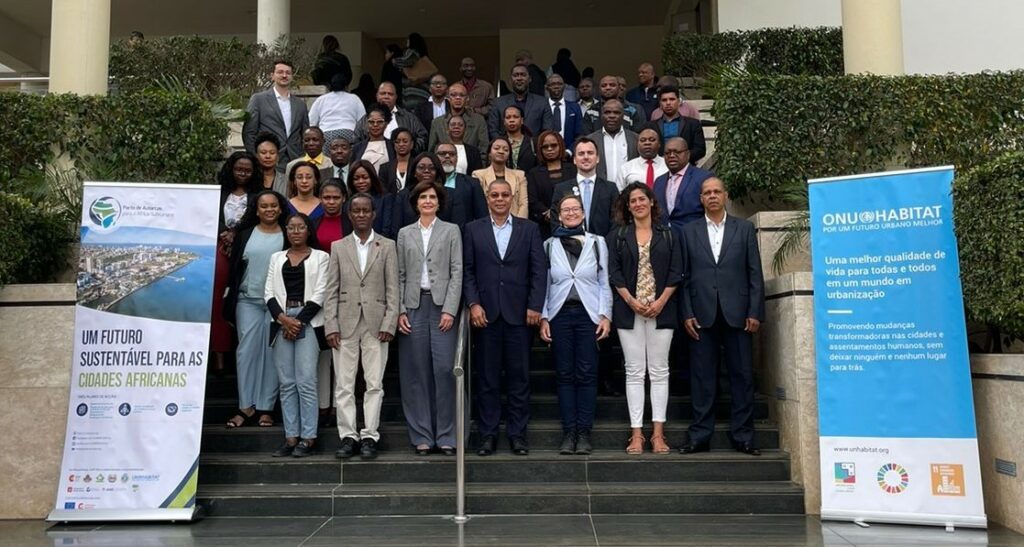15 September 2023
ICLEI Africa supports Mozambique municipalities to develop joint climate and energy plan



As part of the Covenant of Mayors in Sub-Saharan Africa initiative, three municipalities of the Maputo Metropolitan Area have launched a joint comprehensive and evidence-based Sustainable Energy Access and Climate Action Plan, including key climate actions for sustainable mobility.
As part of the Covenant of Mayors in Sub-Saharan Africa (CoM SSA) initiative, three municipalities in the Maputo Metropolitan Area of Mozambique have launched a joint comprehensive and evidence-based Sustainable Energy Access and Climate Action Plan (SEACAP), including key climate actions for sustainable mobility.
As signatories to CoM SSA, the three municipalities of the Maputo Metropolitan Area (MMA) in Mozambique – Maputo, Matola, and Boane – have engaged in a year-long collaboration that has strengthened the capacities of local governments to address climate change as a region. With the financial support of the European Union (EU) and the Spanish Agency for International Development Cooperation (AECID), co-implemented by AECID with technical support from UN-Habitat Mozambique and ICLEI Africa, these three municipalities have laid the foundation for a future of climate action that is context-specific and tailored to the needs of the urban population.
SEACAPs are a response to current and future impacts of climate change in the region and perform a key role by producing robust climate plans ready for implementation. SEACAPs are based on the results of a: Risk and Vulnerability Assessment (RVA); Baseline Emissions Inventory (BEI); and Access to Energy Assessment (AEA). Through extensive data-driven methodologies, these plans avoid maladaptation as actions that may lead to an increased risk of adverse climate-related outcomes (IPCC, 2022).
Africa is the continent most affected by climate change with the fastest growing urban population. As the most populated area in Mozambique, with over 2,7 million inhabitants, the MMA faces many climate and energy challenges. About 70% of Maputo’s population lives in informal settlements and over 35% of dwellings are located in hazardous and environmentally sensitive areas. Economic losses due to climate-related risks in the MMA are estimated at USD 50 million per year. This SEACAP aims to address these challenges and more, by bringing together three neighbouring municipalities to provide a regional and collaborative response to climate change needs in the area, building capacity for local governments to secure climate finance.

ICLEI Africa’s support in developing this climate action plan builds off over two decades of climate planning experience from across Africa, and in this case included carrying out four participatory workshops with over ten sectors represented, as well as conducting 444 household surveys. A pipeline of 43 climate and energy actions has been identified within one framework jointly adopted by the three municipal councils. CoM SSA partners are now supporting the MMA to secure the resources necessary to implement these actions.
Amongst the key climate actions identified within the SEACAP, sustainable mobility is one of the municipalities’ highest shared priorities. All three municipalities identified sustainable public transport actions as of paramount importance. Sustainable public transport actions will reduce MMA’s congested traffic, greenhouse gas (GHG) emissions, and air pollution. One of the highest priority climate adaptation actions is protecting strategic roads that connect the three municipalities from landslides and floods. The Maputo Metropolitan Transport Agency (MTA) is one of the only organisations in the region acting at the metropolitan level, and as such the MTA actively participated in the SEACAP workshops and supported the much-needed collaborative approach to tackle climate change in the area.
The participatory process of developing a joint SEACAP strengthened the capacity of MMA actors to integrate climate change into planning and action. The three neighbouring municipalities developed an evidence-based pipeline of priority climate and energy actions within their own municipality but also, when needed, at the metropolitan level. Many challenges, including climate change planning, need to be tackled at the metropolitan level in rapidly growing African cities and this is why ICLEI Africa encourages such geographically integrated approaches.
The next step for the implementation of priority metropolitan actions is to secure funding, and we encourage the involvement and support of partners in this process. The CoM SSA initiative supports its signatory cities, such as the MAA, in receiving context-specific climate change planning and climate finance support, while working closely with leaders from across the continent to ensure political will and advocacy for the pivotal role that African cities play in the global fight against climate change. To find out more about CoM SSA’s role in unlocking climate finance, watch here: Climate action needs climate finance!
Started in 2015, the Covenant of Mayors in Sub-Saharan Africa (CoM SSA) is a major catalyst for local climate action in the region, with political commitment from over 350 local governments. The purpose of CoM SSA is to support local governments in moving from planning to implementation, with a focus on unlocking climate finance at the local level. The CoM SSA initiative is a European Union (EU) action that supports the external dimension of the European Green Deal, as the global challenges of climate change and environmental degradation require a global response. At the same time, CoM SSA moves to strengthen the Africa-EU partnership and supports Agenda 2063 of the African Union Commission.
CoM SSA is the regional chapter of an international alliance of cities, the Global Covenant of Mayors for Climate and Energy. It is a partnership between city networks, development agencies and funding institutions, supporting cities in meeting the dual challenge of climate change and access to sustainable energy to achieve a low-emission, climate resilient, and sustainable energy future.


